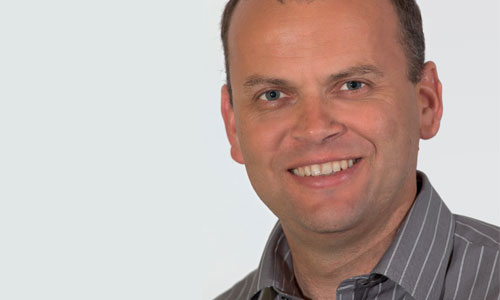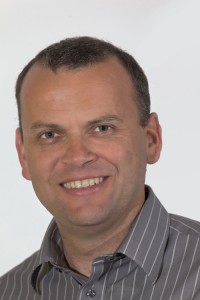
University of Cape Town alumnus Chris Pinkham has a long and illustrious career in the technology industry. He helped launch SA’s first Internet service provider (ISP), Internet Africa; he helped develop Amazon.com’s popular Elastic Compute Cloud (EC2) system; and he now runs Nimbula, a company with offices in Cape Town and Silicon Valley that offers cloud-based infrastructure and services.
“I got into computer science a little by accident while at UCT,” Pinkham says. He wanted to keep studying but couldn’t afford to, so he ended up working for Fred Goldstein, who ran the computer data centre at the university. “He asked me to look into connecting Unix systems to the university network so they could share e-mail,” he recalls. “I landed with my bum in the butter by getting an interesting assignment while still an honours student.”
Pinkham says he then became involved with similar interconnectivity projects underway at the time at Rhodes University and the University of Natal in Durban. Before getting involved with the project, Pinkham says Goldstein’s team had connected UCT to the Unix-to-Unix Copy (UUCP) network run out of UUNet, which became the first ISP in the US.
“We eventually got disconnected from UUNet because of the sanctions against SA at the time,” Pinkham says. “Mike Lawrie and the guys at Rhodes were very inventive with their use of the FidoNet network in keeping us connected.”
Pinkham says his immersion in the world of technology came about as the result of the “intersection of interest and opportunity”. After his stint at UCT he got to work with a man called Randy Bush in Portland, Oregon, which was where SA’s fledgling Internet connectivity landed in the US.
“I ended up working for Randy at a software company where he was vice president of engineering. After about a year I returned to SA to register for a master’s degree and to start an Internet service provider. I’d seen that ISPs were popping up in the US, so I thought, ‘Why not make it happen in SA?’”
Pinkham returned to the country in 1993 and he and two others, Paul Nash and Alan Barrett, began investigating the possibility of launching the country’s first public Internet service provider. Despite battles with Telkom over the provisioning of services, Internet Africa began offering access to the Internet in November 1993.
“When we sold Internet Africa in 1997 to what became UUNet SA [and eventually MTN Business], I left the company, took a year off, and got involved for the next couple of years in a small tech company that went nowhere,” he says.
 In 2000, Pinkham decided he wanted to move back to the US. “Amazon approached me to work in Seattle,” he says. “From 2001 to 2004, my job was running Amazon’s global networks, data centre operations and so on.”
In 2000, Pinkham decided he wanted to move back to the US. “Amazon approached me to work in Seattle,” he says. “From 2001 to 2004, my job was running Amazon’s global networks, data centre operations and so on.”
Pinkham says that at the time, Amazon “was pushing to get profitable” but it was clear the way the company managed infrastructure was inadequate. “We tinkered, but the idea in my mind was that service teams should be able to manage their own infrastructure deployments and make requests for infrastructure in real time.”
This idea would eventually crystalise into Amazon’s EC2 service.
Then another life-changing moment came along. Pinkham had a second child and decided to return to Cape Town.
“Amazon was interested in my ideas and asked me to stay with the company,” he says. “I started Amazon Development in Cape Town in 2004 and set about hiring people.”
Other than one senior engineer seconded from Seattle and some help from Amazon with the initial system design, Pinkham put together a team comprised entirely of South Africans — a team that’s still together today, he says.
Pinkham left Amazon when EC2 was built and decided to take another break from the action. Willem van Biljon, a friend of Pinkham’s who had joined EC2 early on, was also taking time out and the two men decided to get into business together.
“We had a set of ideas for a new service that we experimented with, and we came to Silicon Valley to look for finance.”
The pair eventually secured US$5m of investment capital from Sequoia Capital and Nimbula got off the ground. The company is hoping to “extend the cloud computing concept so services aren’t available only in Amazon’s data centres but in lots of locations and from other service providers”.
 “We’re taking and improving on the ideas Amazon pioneered but extending them to a broader range of businesses,” he explains. He says he has a vision of a “distributed, multi-geographic, multi service provider infrastructure service”.
“We’re taking and improving on the ideas Amazon pioneered but extending them to a broader range of businesses,” he explains. He says he has a vision of a “distributed, multi-geographic, multi service provider infrastructure service”.
“It’s a rare opportunity to get a second go at making something work. Amazon has been hugely successful in its service offering for developers, but we’re working at taking it even further.”
The plan was always to build a company in Silicon Valley because, Pinkham says, it’s “very tough to do it in SA. Compared to the US, the market is small and so is the talent pool.”
Pinkham says it is not impossible to launch a technology start-up in SA but he says it’s easier in the US to “hire, fundraise, create partnerships with large tech companies and deal with lawyers”.
“It’s just easier to do this sort of business here,” he says. “In fact, the marketplace here is very different to anywhere else in the world and hard to reproduce. It has been done to a smaller extent in London, Austin and Tel Aviv, but not on the same scale.”
Delving further into Nimbula’s plans, Pinkham says there’s a new development and operating model emerging. “Because of the technology of years gone by, there’s a tendency towards centralised, admin-heavy practices of deploying software through centralised teams. It’s good work, but the nature of centralisation is that it slows things down.”
Pinkham says Nimbula is trying to speed up the rate of innovation with technology that allows for greater individual control of infrastructure. “We’re in the early-adopter phase. I think we’ll see far more mainstream uptake from government and businesses as they begin to see the value in freeing up the development process.”
Pinkham says cloud services will become pervasive and adopted by developers of all stripes, “not just the newest product sorts”.
He says the world is seeing the “beginning of the end” of the PC era, evidenced last week by Hewlett-Packard’s decision to defocus from the consumer PC business. As cloud computing matures there’ll be “massive growth in the number of applications and the ability to increasingly quickly deploy them to devices”.
“Everyone wants to create apps, and the result is many poor ones. But it’s cheap and quick so people can try lots of things and pursue the ones that work. There are hundreds of thousands of ideas that can be explored, and that’s really exciting.”
Pinkham says one of things that most excited him most about EC2 was the team was able to help democratise the software development process. “If there’s an entrepreneur in Nairobi, he can now compete with someone in New York for data distribution services,” he says.
“My science teacher once asked my class what would we like to invent. There was a general attitude from the class to the effect of ‘but haven’t we invented it all already?’. He smiled and told us we had no idea how different the world would be when we reached his age. He was right.”
Pinkham says he’d like to encourage “entrepreneurially-minded South Africans to get out there and invent. There’s never been a better time or better access to markets and tech. Jump in, take risks, because the rate of innovation is only going to increase. It’s much more fun to be ahead of the curve than chasing it.”
He should know. — Craig Wilson, TechCentral
- Subscribe to our free daily newsletter
- Follow us on Twitter or on Facebook




